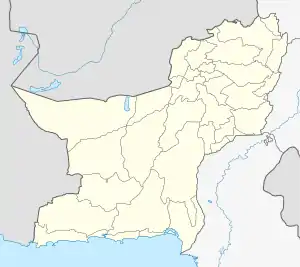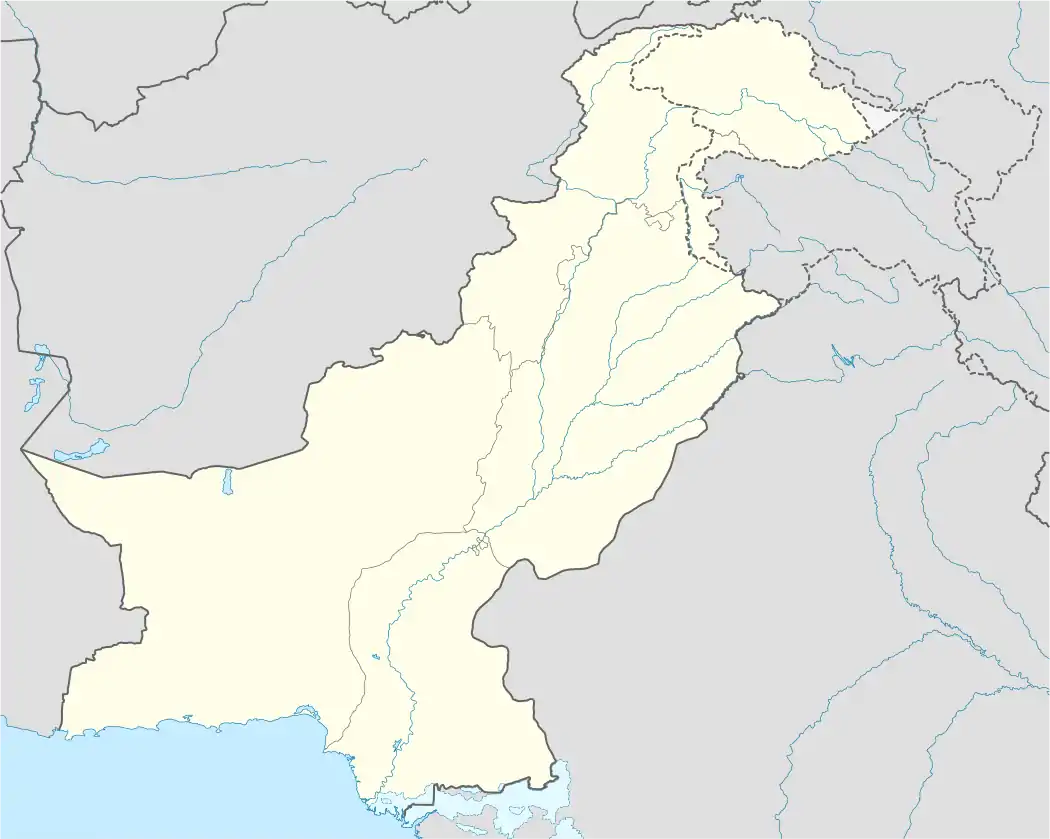Khuzdar
Khuzdār (Brahui/Balochi: خوزدار; Urdu: خُضدار), historically known as Quṣdār,[2] is the capital city of Khuzdar District in the central part of Balochistan Province, Pakistan. Khuzdar is the third-largest city of Balochistan province and It is the 47th largest city of Pakistan by population according to the 2017 census.. Historically, Khuzdar was the main city and capital of the Jhalawan province of the Khanate of Kalat. From October 1952 to 1955, it became part of the Balochistan States Union. In 1955, Khuzdar became the capital of the newly formed Kalat Division. Currently, It is the largest Brahui-speaking city.
Khuzdar
خُضدار | |
|---|---|
.jpg.webp) Khuzdar city | |
 Khuzdar  Khuzdar | |
| Coordinates: 27°48′N 66°37′E | |
| Country | |
| Province | Balochistan |
| Elevation | 1,237 m (4,058 ft) |
| Population | |
| • City | 182,927 |
| • Rank | 47th in Pakistan; 3rd in Balochistan |
| Time zone | UTC+5 (PST) |
| Calling code | +92848 |
History
Khuzdar was the capital of the Brahui kingdom of Makran.[3]
In the early 17th century it was part of the Jhalawan Kingdom, but it soon fell under the Khanate of Kalat, where it remained until a series of revolts during the reign of Khudadad Khan (1857–1893). By 1896, after Khudadad's death, the authority of Kalat was restored.[4] Khuzdar was the capital and largest city of the Jhalawan province of the Khanate of Kalat.
Under a treaty with Kalat, the British appointed a political agent at Khuzdar in 1903. British assistance continued until 1947, after which the area was acceded to Pakistan and became a democracy. When the Baluchistan States Union became Kalat Division, Khuzdar was established as the divisional headquarters. The divisional administration of Pakistan ended in 2000. Khuzdar was again established as the Divisional headquarters in June 2009 by the Pakistan Peoples Party Government.
Education
Khuzdar serves as the learning center for the Balochistan province. The city has a number of government and private colleges, including the following:
- Balochistan Residential College
- Balochistan University of Engineering and Technology
- Boys Degree College, Khuzdar
- Al Farooq Residential School, khuzdar
- Divisional Public School and College, Khuzdar
- Girls Degree College, Khuzdar
- Government College of Elementary Education (Women), Khuzdar
- Hamdam College of Education, Khuzdar
- Jhalawan Law College
- Jhalawan Medical College
- Lasbela University of Agriculture, Water and Marine Science, Khuzdar campus
- Pakistan Public School, Khuzdar
- Sardar Bahadur Khan Women's University, Khuzdar sub-campus
- Shaheed Sikander Zarakzai University, Khuzdar
- Sunrise Public School and College, Khuzdar
- Workers Model Higher Secondary School
Geography and climate
Khuzdar is at the apex of a narrow valley at an elevation of 1,237 metres (4,058 ft). Despite this altitude, Khuzdar like most of Balochistan has an arid climate (Köppen BWh) with very low and erratic rainfall. Unlike most parts of the province, the heaviest average rainfall comes from the Asian monsoon in July and August, though this rainfall tends to be very erratic and in many summers there is no significant rain at all.
| Climate data for Khuzdar | |||||||||||||
|---|---|---|---|---|---|---|---|---|---|---|---|---|---|
| Month | Jan | Feb | Mar | Apr | May | Jun | Jul | Aug | Sep | Oct | Nov | Dec | Year |
| Record high °C (°F) | 27.1 (80.8) |
28.4 (83.1) |
33.0 (91.4) |
37.2 (99.0) |
41.7 (107.1) |
43.0 (109.4) |
43.0 (109.4) |
42.0 (107.6) |
40.2 (104.4) |
38.0 (100.4) |
31.2 (88.2) |
28.0 (82.4) |
43.0 (109.4) |
| Average high °C (°F) | 17.0 (62.6) |
18.4 (65.1) |
23.5 (74.3) |
29.9 (85.8) |
35.0 (95.0) |
38.1 (100.6) |
36.2 (97.2) |
35.4 (95.7) |
34.0 (93.2) |
29.9 (85.8) |
24.9 (76.8) |
21.4 (70.5) |
28.6 (83.6) |
| Daily mean °C (°F) | 10.1 (50.2) |
11.7 (53.1) |
17.0 (62.6) |
23.2 (73.8) |
28.1 (82.6) |
31.3 (88.3) |
30.3 (86.5) |
29.3 (84.7) |
27.0 (80.6) |
21.9 (71.4) |
16.7 (62.1) |
11.9 (53.4) |
21.5 (70.8) |
| Average low °C (°F) | 3.2 (37.8) |
5.0 (41.0) |
10.7 (51.3) |
16.5 (61.7) |
21.3 (70.3) |
24.5 (76.1) |
24.3 (75.7) |
23.2 (73.8) |
20.1 (68.2) |
13.9 (57.0) |
8.4 (47.1) |
4.5 (40.1) |
14.6 (58.3) |
| Record low °C (°F) | −8 (18) |
−4.1 (24.6) |
0.6 (33.1) |
8.6 (47.5) |
11.0 (51.8) |
16.0 (60.8) |
17.0 (62.6) |
15.0 (59.0) |
12.8 (55.0) |
5.0 (41.0) |
1.0 (33.8) |
−6.1 (21.0) |
−8 (18) |
| Average rainfall mm (inches) | 16.9 (0.67) |
26.1 (1.03) |
27.7 (1.09) |
12.6 (0.50) |
13.1 (0.52) |
11.1 (0.44) |
47.7 (1.88) |
64.5 (2.54) |
6.4 (0.25) |
5.0 (0.20) |
5.7 (0.22) |
15.6 (0.61) |
252.4 (9.95) |
| Source: NOAA (1971–1990) [5] | |||||||||||||
References
- "PAKISTAN: Provinces and Major Cities". PAKISTAN: Provinces and Major Cities. citypopulation.de. Retrieved 4 May 2020.
- Juvaini, Ata-Malik; Juvaynī, ʻAlāʼ al-Dīn ʻAṭā Malik; Qazvini, Mizra Muhammad (April 13, 1997). Genghis Khan: The History of the World Conqueror. Manchester University Press. ISBN 9780719051456 – via Google Books.
- Risley, Herbert Hope (1903) Census of India, 1901. Volume I. India. Ethnographic appendices, being the data upon which the caste chapter of the Report is based Office of the Superintendent of Government Printing, Calcutta, page 66, OCLC 2196225
- Hughes-Buller, R. (ed.) (1908) Imperial gazetteer of India: Provincial Series: Baluchistan Office of the Superintendent of Government Printing, Calcutta, pages 16–17
- "Khuzdar Climate Normals 1971–1990". National Oceanic and Atmospheric Administration. Retrieved January 17, 2013.